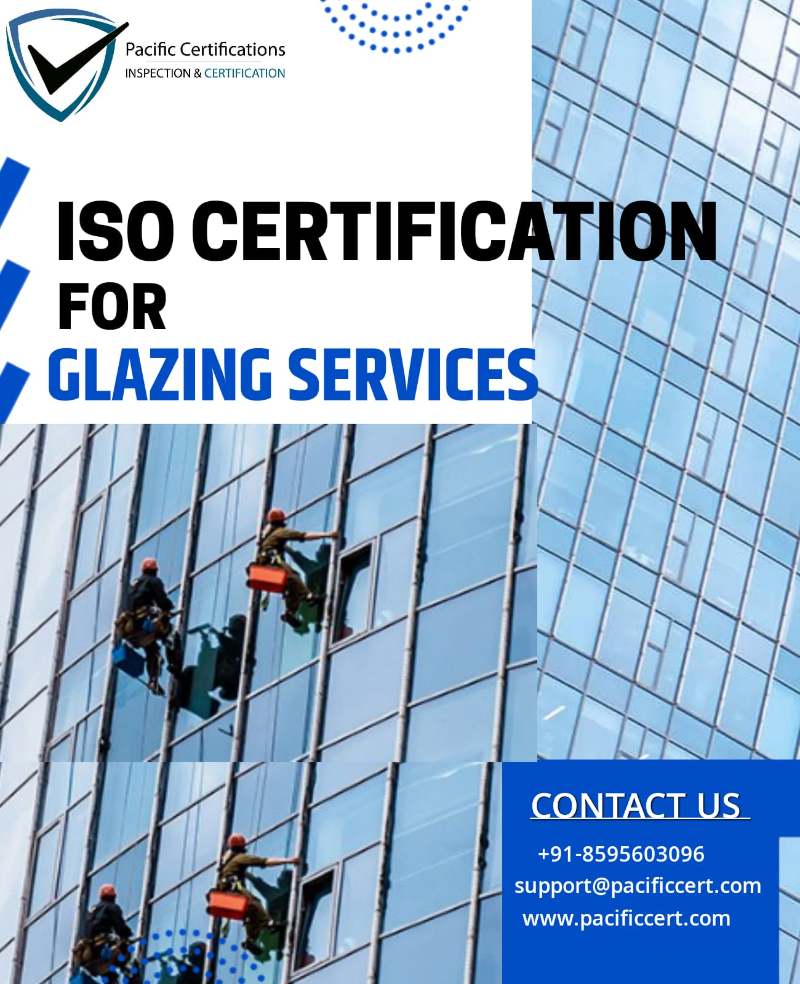ISO Certifications for Glazing Services, Requirements and Benefits

Introduction
The glazing services industry operates in a precision-driven, safety-critical, and compliance-focused environment where workmanship quality, material conformity, workplace safety, and project reliability directly influence structural performance and client trust. Glazing service providers are involved in activities such as glass installation, façade glazing, curtain wall systems, windows and doors fitting, safety and tempered glass installation, structural glazing, sealing, maintenance, and on-site project execution across residential, commercial, and industrial projects.
With increasing construction regulations, higher safety expectations, stricter project timelines, and growing demand for certified contractors, glazing companies are under pressure to demonstrate disciplined operational control. Poor installation quality, safety incidents, inconsistent processes, or lack of documentation can result in rework, liabilities, and reputational damage. ISO certifications provide a structured framework for glazing service providers to standardize operations, ensure safety compliance, manage risks, and strengthen credibility with developers, architects, contractors, and regulators.
In glazing services, trust is built on precision, safety, and consistency.
Quick Summary
ISO certifications provide glazing services companies with internationally recognized frameworks to manage service quality through ISO 9001, ensure occupational health and safety through ISO 45001, manage environmental responsibilities through ISO 14001, strengthen information and document control through ISO/IEC 27001, ensure business continuity through ISO 22301, and support structured risk governance through ISO 31000. These standards help glazing contractors deliver reliable, safe, and compliant services across projects.
For guidance on selecting the most relevant ISO standards for your glazing services business, contact [email protected].
Applicable ISO Standards for Glazing Industry
ISO 9001: Quality Management Systems (QMS)
ISO 9001 helps glazing service providers bring consistency across project planning, material inspection, installation procedures, supervision, quality checks, and defect handling. It supports standardized workflows that reduce rework, improve installation accuracy, and ensure projects meet client and regulatory requirements.
ISO 14001:2015 - Environmental Management System (EMS)
ISO 14001 supports glazing companies in managing environmental aspects such as glass waste, packaging disposal, noise, dust, and use of sealants and chemicals. It demonstrates environmental responsibility and helps meet project and regulatory environmental expectations.
ISO 45001:2018 - Occupational Health and Safety Management System (OHSMS)
Glazing work involves high-risk activities such as working at heights, handling heavy glass panels, cutting operations, and use of lifting equipment. ISO 45001 provides a structured framework to identify hazards, control risks, ensure legal compliance, and create a safer working environment for installers and site personnel.
ISO 27001: Information Security Management Systems (ISMS)
Glazing contractors manage sensitive project data including architectural drawings, specifications, contracts, pricing, and client records. ISO/IEC 27001 ensures that such information is protected against unauthorized access, loss, or misuse, particularly when working with digital drawings and shared project platforms.
ISO 22301:2019 – Business Continuity Management Systems
Construction projects are often exposed to disruptions such as supply delays, labor shortages, site shutdowns, or external emergencies. ISO 22301 ensures that glazing services can continue critical operations, recover quickly from disruptions, and meet contractual commitments.
ISO 31000:2018 – Risk Management
ISO 31000 enables glazing service providers to systematically identify and manage risks related to safety incidents, project delays, quality failures, contractual disputes, and operational dependencies. It strengthens decision-making and improves project outcomes.
Click here to find out more applicable standards to your industry
What are the Requirements of ISO Certifications for Glazing Services?
Glazing service providers seeking ISO certification must establish documented management systems and demonstrate consistent implementation across projects and operations. Key requirements include the following:
ISO 9001:2015 – Quality Management Systems Requirements
Document glazing installation, inspection, and project execution procedures
Define quality objectives aligned with project specifications and client expectations
Control drawings, method statements, inspection records, and reports
Monitor non-conformities, defects, and rework incidents
Implement corrective actions and continual improvement
Conduct internal audits and management reviews
ISO 45001:2018 – Occupational Health & Safety Requirements
Identify site-specific and task-related hazards
Assess OH&S risks and implement control measures
Ensure compliance with safety regulations and permit requirements
Provide safety training, PPE, and toolbox talks
Establish incident reporting and emergency response procedures
Monitor safety performance and improve controls
ISO 14001:2015 – Environmental Management Requirements
Identify environmental aspects related to glazing activities
Control waste generation, disposal, and recycling
Manage use of chemicals, sealants, and consumables
Ensure compliance with environmental regulations
Monitor environmental performance and improvement actions
ISO/IEC 27001:2022 – Information Security Requirements
Identify and classify project and business information assets
Conduct information security risk assessments
Implement access control and document protection measures
Secure digital drawings and shared platforms
Manage third-party access to information
Monitor and improve ISMS effectiveness
ISO 22301:2019 – Business Continuity Requirements
Identify critical glazing operations and project dependencies
Conduct business impact analysis (BIA)
Develop continuity and recovery plans
Plan for supply chain and labor disruptions
Test and review continuity arrangements
Tip:Map one complete glazing project lifecycle—from tendering and material procurement to installation, inspection, and handover—against ISO requirements to identify quality, safety, and continuity gaps early.
For assistance in evaluating your glazing services against ISO requirements, contact [email protected].
What are the Benefits of ISO Certifications for Glazing Services?
ISO certifications offer glazing service providers significant operational, commercial, and reputational benefits, including:
Consistent installation quality and reduced rework
Improved workplace safety and fewer incidents
Better compliance with construction and safety regulations
Stronger control over project documentation and records
Increased trust from developers, contractors, and consultants
Improved eligibility for tenders and large construction projects
Better risk identification and project planning
Reduced delays and cost overruns
Enhanced environmental responsibility
Stronger long-term business credibility
The global construction and façade market continues to expand, driven by urban development, green buildings, and architectural demand for glass-intensive designs. The global façade and glazing market is projected to exceed USD 300 billion over the few years, supported by infrastructure projects, commercial developments, and sustainability-focused construction.
At the same time, developers and regulators are placing greater emphasis on contractor competence, safety performance, and documented management systems. Glazing service providers that demonstrate ISO-aligned governance are better positioned to secure high-value projects, meet compliance expectations, and operate safely at scale. In future, ISO certifications such as ISO 9001, ISO 45001, and ISO 14001 are expected to be baseline requirements for professional glazing contractors in regulated construction markets.
How Pacific Certifications Can Help?
Pacific Certifications, accredited by ABIS, acts as an independent certification body for glazing services companies by conducting impartial audits against applicable ISO standards. Our role is to objectively assess whether documented management systems and glazing operations conform to international ISO requirements, based strictly on verifiable evidence and records.
We support glazing service providers through:
Independent certification audits conducted in accordance with ISO/IEC 17021
Objective assessment of quality, safety, environmental, and risk controls
Clear audit reporting reflecting conformity status and certification decisions
Internationally recognized ISO certification upon successful compliance
Surveillance and recertification audits to maintain certification validity
Contact Us
If you need more support with ISO certification for Glazing Services, please contact us at +91-8595603096 or[email protected]
Author: Ashish
Read More at:Blogs by Pacific Certifications

